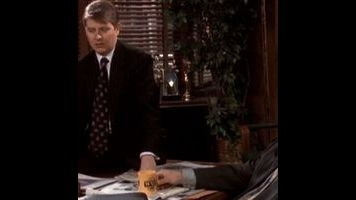NewsRadio: "Jackass Junior High" and "Sinking Ship"

So what is funny?
It’s the question we’ve been asking ever since this reconsideration of NewsRadio began three years ago. Those of you who’ve come every summer and every week to read and discuss are bound by a rough consensus that something about this show, underappreciated at the time but recognizable still, outlines an answer — at least, one of the possible answers. Those of us who write about comedies face the question every time we shift our gaze from the TV screen to the computer screen and face the blank document. And not to get too pretentious in a week where we contemplate the NewsRadio creative team raising what seems to be a huge middle finger to their network, but the question lies underneath every episode of every sitcom ever made. We viewers respond partly to the humor worked into the scenario, but partly also to the confidence with which the artists assert that they know the answer.
And it’s a question asked explicitly by the most elegant bit of juxtaposition in “Jackass Junior High,” as Bill tells a joke that falls flat, and Walt (and who among us could have expected that Walt would be central to this key philosophical moment?) picks up the rebound and stuffs it in the comedy basket, sparking a general celebration. Let’s look at the scene carefully.
- Bill is anxious about his position in the group. He hasn’t been asked to do the voices for the Crazy Eric’s electronics store ad, even though he believes that (a) he’s a gifted mimic, and (b) his mimicry is funny. Dave apparently speaks for the rest of the office when he asserts that (a) Bill is the best voiceover man in the business, but (b) funny is the one thing his voice talents are not. Now Bill faces yet another rival for his centrality — nay, ubiquity — on the WNYX staff, in the person of Mark Davis, man of a thousand voices (“a thousand and one, actually,” Davis corrects). But more importantly, he faces an identity crisis. Suddenly, making the staff laugh becomes central to his self-image. He’s the needy performer, the overcompensating clown, the star obsessed by plots to topple his fame. The only thing that can temporarily reassure him is adulation.
- Walt is in a big foam suit. Sometimes people misunderstand costume humor. It’s not the costume that’s funny. It’s the juxtaposition of the costume with the action and reaction that goes on within and around it. A hot dog dancing isn’t funny, but a hot dog dancing while someone looks at it incomprehendingly or seethingly might be. A giant microphone isn’t funny, but a giant microphone standing in a group of people who don’t seem to notice that anything is strange might be. And of course, when the costume moves and speaks, humor can arise from the way normal gestures get transformed at the costume’s outsized scale, and from our sense of the personality of the costume’s wearer versus the personality asserted by the costume itself.
- A dichotomy of reactions ensues. Bill suggests that he can’t hear Walt because Walt needs to turn himself on. It’s an impromptu performance, an ad hoc bid for his colleague’s approval — and so it’s delivered like a Borscht Belt comic mugging to the footlights. Crickets. Then Walt cruelly turns the tables: “Maybe people couldn’t hear you, Bill. Next time try speaking into me!” There’s even a little bend at the waist, as if to direct the giant sound-collecting bulb toward Bill. Hilarity ensues, high fives all around.
As with the classic positing of this question in comedy — Monty Python’s Oscar Wilde sketch — the difference between a joke that doesn’t work and one that does is revealed to be the audience’s sense of the speaker’s confidence and control, mixed with sheer spitefulness and caprice. It has nothing to do with the inherent quality of the witticism. Funny is whatever someone does who doesn’t need to be reassured that he’s funny.
 Keep scrolling for more great stories.
Keep scrolling for more great stories.
